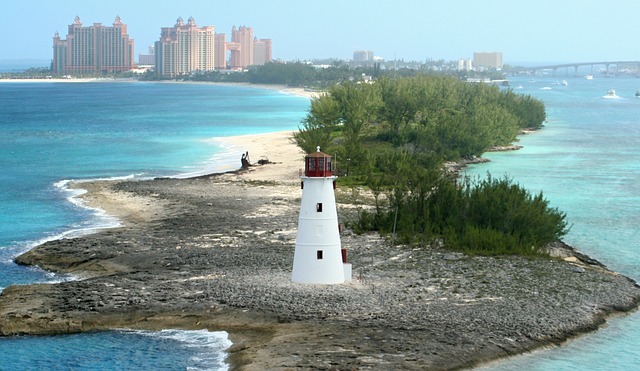| Works of Annie Fields |
by
Annie Fields
1896
Part 8
The Bahamas
Saturday 22 February - Sunday 1 March
Page 92 continued
[ Saturday 22 February ]
Saturday 22d Yesterday we reached Inagua* and
rested there overnight -- sending ashore for water and finding
good welcome and water, but Mr. Sargent (our consul) had
broken his ^one^ wrist and maimed the other.
There was fever and ague on the island (probably brought there
as they say it is not common there,{)} and altogether [poor ?]
Inagua sounded more forlorn than ever. We started for
Nassau again in the morning of Saty but the seas were
frightfully rough again from the North East & our crew are
labored with waves breaking over us all day. It was with
great difficulty, by putting up our sails and close watching
of the engine that we got to "Crooked Island Harbor"* about
ten o'clock and there although we were swinging and were at
times as uncomfortable as we could have been in a moderate sea
-- we weighed anchor [dropped anchor is intended?].
This
tried S.O.J.'s patience and mine sadly. It had been a
hard day and unless the wind greatly abates we must have one
more before we reach Nassau: however, it is only one
more and two nights if all is well.*
[ Sunday 23 - Monday 24 February ]
Sunday Feby 23 At harbor before Crooked
Island. Brown men in small boats are surrounding us with
fruits for sale. They are very welcome to my sight
because they speak of the land and they are full of
life and picturesque action and they break the monotony of the
sea. We have a nice little island close by -- If we were
at Nassau we should be preparing our letters to go by
tomorrow's steamer which I fear now we shall lose.
Page 93
Page 94
a place upon Parnassus.* T. B. A. said in speaking of Howells and of our care for him. "Yes," Henry James said to me "I like Howells immensely and would like to see more of him, but somehow I do not al-together like his conjugal appendage"!* We sat up until we greeted the lights in Nassau harbor about midnight.
Notes
Crooked Island Harbor: Crooked
Island is in the south-central area of the islands of
the Bahamas. From Inagua to Crooked Island is about 120
miles.
Eugenie Grandet ... Balzac ... Mrs. Wormley for making her
translations ... La Comedia Humaine: Wikipedia says:
"Honoré
de
Balzac ... (20 May 1799 - 18 August 1850) was a French
novelist and playwright. His magnum opus was a sequence
of short stories and novels collectively entitled La Comédie
Humaine, which presents a panorama of French life in the
years after the 1815 Fall of Napoleon Bonaparte." "Eugénie
Grandet is an 1833 novel ... about miserliness, and how it
is bequeathed from the father to the daughter, Eugénie, through
her unsatisfying love attachment with her cousin."
Wikipedia also says: "Katherine
Prescott
Wormeley (January 14, 1830 - August 4, 1908) was an
American nurse in the Civil War, author, editor, and translator
of French language literary works .... She was one of the best
known translators of her time, having translated from the French
language the complete works of Honoré de Balzac (40 vols.,
1883–97) for American readers."
the anthology of the Victorian Era ^Stedman^ which I
brought{.} .... Owen Meredith ... Aristocracy: In
part 2 of the journal, Fields discussed reading from the then
new volume, A
Victorian Anthology, 1837-1895: Selections Illustrating
the Editor's Critical Review of British Poetry in the Reign of
Victoria by Edmund
Clarence Stedman (Boston: Houghton, Mifflin, 1895).
Owen Meredith is a pen name used byEdward
Robert Lytton Bulwer-Lytton, 1st Earl of Lytton (1831 -
1891), an English statesman and poet. Wikipedia says:
"When Lytton was twenty-five years old, he published in London a
volume of poems under the name of Owen Meredith. He went on to
publish several other volumes under the same name. The most
popular one is "Lucile," a story in verse published in 1860.
Although not much read today, his poetry was extremely popular
in his own day." Meredith's poem, "Aristocracy" does not
appear in the 1906 edition of A Victorian Anthology
currently available from Google Books. The following is
quoted from The
Poetical
Works of Owen Meredith.
a place upon Parnassus: Wikipedia says: "Mount Parnassus ... is a mountain of limestone in central Greece that towers above Delphi, north of the Gulf of Corinth, and offers scenic views of the surrounding olive groves and countryside. According to Greek mythology, this mountain was sacred to Dionysus and the Dionysian mysteries; it was also sacred to Apollo and the Corycian nymphs, and it was the home of the Muses." Fields probably refers to it mainly as the home of the Muses.Aristocracy
To thee be all men heroes; every race
Noble: all women virgins: and each place
A temple: know thou nothing that is base.
speaking of Howells ...Henry
James: Wikipedia
says: "William Dean Howells (1837 - 1920) was an American
realist author, literary critic, and playwright. Nicknamed
"The Dean of American Letters," he was particularly known for
his tenure as editor of the Atlantic Monthly as well
as his own prolific writings, including ... the novels The
Rise of Silas Lapham and A Traveler from Altruria."
Howells
had preceded T. B. Aldrich as Atlantic Monthly editor
(1871-81). During that period, Howells fostered the
career of Sarah Orne Jewett and published both Jewett and
Annie Fields.
"On Christmas Eve 1862, at the
American embassy in Paris, he married Elinor Mead, a sister of
the sculptor Larkin Goldsmith Mead and the architect William
Rutherford Mead, the Mead of McKim, Mead, and White. Among
their children was the future architect John Mead
Howells." While Aldrich quotes the American novelist, Henry James,
a mutual friend of Howells, Aldrich, Fields, and Jewett, as
disliking Elinor Howells, when Elinor died in 1910, James
"offered his condolences, writing, 'I think of this laceration
of your life with an infinite sense of all it will mean for
you.'"
Tuesday Feb. 25th Rose very early to write a few
letters before we can get ashore for the mails --
Unfortunately we missed yesterday's steamer but we have not a
word to say except of gratitude at getting back since we could
not accomplish our visit to the Windward Islands* which has
been a real disappointment. (I omitted to make a note of the
unspeakable loveliness of the waters at Crooked Island.
We could see everything upon the bottom many many feet
below. At night when we started away the lovely flying
fish* seemed to accompany the vessel on their silver wings and
ten flew into the ship. We had them for dinner last
night! If they offered themselves in this way, it was at
least better than maiming them with a hook.)
[ Wednesday 26 February ]
Tuesday Wedy 26th This is
the conference at Chardon St.* I am lazily swinging in
the harbor of Nassau. Went ashore to the hotel*
yesterday which was quite full and wore quite an air
of business. The trees were not quite as
beautiful as when we were here a month ago -- There were more
dead leaves
Page 95
and the spring growth was scarcely apparent, but the flowers have made great strides. A splendid yellow rose, like a more delicate Marshal Niel* was covering the porches. Splendid flowers were sent over to the ship from the butcher and coachman etc -- A "Norther" came up in the afternoon which made it difficult to hold on to our raiment and the waves danced about greatly as we returned to the ship. The boatman found it a heavy pull. It was a cool evening and we sat in-doors. This morning I hesitated about a sea-bath, but found it in the end very refreshing -- We are anchored just where we can look into the little town (off the buildings of the Constabulary at one side and the lighthouse on the other* -- 5 or 6 ships from Palm beach have been obliged to roll about two days before landing, making it rather bad business to go there and one not likely to be continued.
[ Thursday 27 February ]
Page 96
Last evening was a wondrous night -- the moon nearly full, the air cool, and noises of the town the bells, taps, and the other sounds of human and animal life came to us softened over the water -- this exquisite peacock hued water, clear as crystal which allows us to see the bottom at thirty feet or so, even in the moonlight. Nothing could be more perfect than the atmosphere. We sat on the yacht reading sewing and talking T. B. A. S.O.J. and I during the morning and were then rowed ashore in the exquisite sunshine to dine. After dinner and our happy mail (telling us all were well and the cold terrible, below zero frequently and snow-storms when it moderates but "happy" because everybody was well) we drove again through the pretty streets and by the water side to some little shops there full of marine curiosities which we devastated! But I shall remember longer than the shops, how sweet and still it was there walking about and waiting for the [purchasers corrected], how lovely the breeze from the sea and the clear sunshine: the little tinkle of the piano of the shopkeepers wife who lived in a neat cottage opposite* -- the yellow sea poppies by the roadside, the blazing hibiscus in the gardens not far away.* This is Nassau.
Page 97
[ Friday 28 February ]
Friday Feb. 28th Still at Nassau. Yesterday afternoon we walked about the little town and peeped through the open gates at the gardens as we went. The air was perfect and we were better for our walk.
Today we started early in a sail-boat to see the "sea-gardens",* but alas! when we came near the place after an hour's sailing, the high winds prevented us from getting into the small boat and we saw none of the wonders. However the beauty of the harbor as we went was enough to go for; the water the color of peacocks -- green and blue and clear as crystal coming back we flew in fifteen minutes and never confessed that we did not see the fish and coral.
The others have gone ashore now without us. The winds are very high and it is dusty in the streets -- here it is quiet and sweet --
More and more I understand that schemes for enjoyment, simply, in this world are for the most part aside from the Divine plan. We are here to labor for others and to seek to know the purpose of life and its opportunities; to do such work as we can find to do with all our might *-- T. B. A. said the other day that he "would accept comfort at any time rather than intelligence." And somehow this terrible word, as it strikes me has been in my mind ever since. It strikes at the root of all morality and my spirit revolts at it --
Page 98
My heart holds one prayer -- to be able to live a devout
life. Hear me Good Lord! May every other desire be
wiped from me.
[ Saturday 29 February ]
Saturday -- Feb. 29th While others are laboring at home I think of these idling days often with ruefulness and yet one might be on one's bed at home from a cold! A great storm, lightning and thunder and [wind ?] lasting until about midnight -- not heavier than such summer storms are at home -- indeed not the fiercest I have seen. It was splendid and awful enough however. I did not like to sit on deck with the draft blowing through the open cabin and so went to bed. We carry two lightning rods attached to the masts. The lower ends lie coiled up at the foot of the mast until the storm comes when they are thrown overboard -- The Captain did not know about these or did not think and we found one coiled up all ready to carry the lightning into the heart of the ship! The people on these islands all make baskets -- they are less interesting here than elsewhere but fortunately some are brought here from the other islands -- To watch the beautiful water here is an endless pleasure. Brown boys come round in small boats to dive for pennies and their little bodies wriggling under water are strange species of animals to gaze at!
Page 99
[ Sunday 1 March ]
^Sunday March First^
We were utterly wearied with sitting on board the ship on Saturday. In the afternoon Mr. Pierce took me ashore in spite of the wind which rose before noon and tossed us most unpleasantly whether we were on the ship or off of her. It was warm also and we felt weak and a little sick -- altogether it was a bad day [Deleted word] until I was able to get free of the ship for an hour near sundown and take a short ride inland. The precious hour went sadly, because we could do absolutely nothing, and we were impatient ------
However!! as I said the longest day has an end and I was greatly revived by [ the superimposed over another word] short ride through the quiet little streets of Nassau. [Penciled in the right margin: She did not feel able to go.]
Today at four we sail at last for Florida, (Palm Beach) where
we are to land.
Notes
Windward Islands: According to Wikipedia, the Windward Islands are: Dominica (formerly administered as part of the Leeward Islands),
Martinique, Saint Lucia, Saint Vincent and the Grenadines, and Grenada. "The Windward Islands are called such because they were more windward to sailing ships arriving in the New World than the Leeward Islands, given that the prevailing trade winds in the West Indies blow east to west. The trans-Atlantic currents and winds that provided the fastest route across the ocean brought these ships to the rough dividing line between the Windward and Leeward islands." This string of islands stretches southeastward from Puerto Rico toward Venezuela. Had weather permitted, the Hermione could have traveled much further south, almost to the South American coast.
flying fish: Wikipedia says: "The Exocoetidae are a family of marine fish ... known as flying fish.... Flying fish can make powerful, self-propelled leaps out of water into air, where their long, wing-like fins enable gliding flight for considerable distances above the water's surface. This uncommon ability is a natural defense mechanism to evade predators."
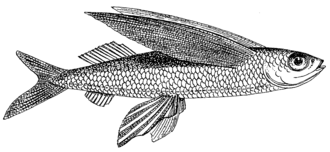
Flying fish
Image courtesy of Wikipedia
the conference at Chardon St: In Annie Adams Fields, Margaret Roman discusses this cruise and notes that Fields missed a "charity conference," but does not specify which conference (145-6). Wikipedia says that before the 1960s, Chardon Street in Boston connected Bowdoin Square to Merrimac and Portland Streets. The Boston Bureau of Charities and Temporary Home (built in 1868) was located at
33-35 Chardon Street. Serving as a foundling home and housing the offices of various charities, it was popularly called "The Charity Building." Among the charities located there was the one with which Fields is most closely associated, "The Co-operative Society of Visitors among the Poor," according to King's Dictionary of Boston by Edwin Monroe Bacon (1883), p. 106.
the harbor of Nassau ... the hotel: See the notes for Part 2 of the journal on Nassau and the hotel.
Marshal Niel: Marchal
Niel is a variety of yellow rose.
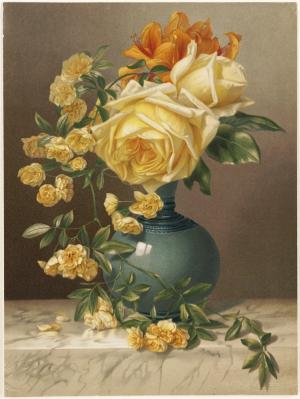
Marchal Niel Roses
Mrs. William Duffield (1819-1914)
[ca. 1861–1897]
Boston Public Library
the buildings of the Constabulary at one side and the lighthouse on the other: Fields tries sea-bathing in the harbor between the lighthouse and the constabulary. While there are several lighthouses in Nassau bay today, only two of these could have been in operation in 1896, the Paradise Island light and the Government House cupola light in the city of Nassau. It seems more likely Fields refers to the Paradise Island light, which has long been a local landmark. The precise location of the constabulary office Fields mentions is not known, but it may be inferred that this building was then south of the lighthouse.
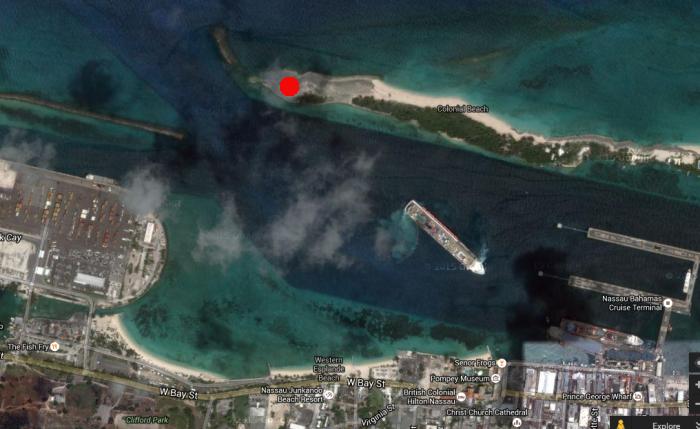
Longfellow's birthday. 22d
Washington's: Wikipedia says: "Henry
Wadsworth
Longfellow (February 27, 1807 - March 24, 1882) was an
American poet and educator whose works include "Paul Revere's
Ride," The Song of Hiawatha, and Evangeline."
George
Washington, the first President of the United States, was
born on February 22, 1732.
a poor ne'er do well from Malden: This sailor
hails from Malden,
MA, which is now a northern suburb of Boston.
tinkle of the piano:
Fields
is revisiting sites from the party's first visit to Nassau on
January 18 (Part 2, p. 36).
yellow sea poppies by the
roadside, the blazing hibiscus in the gardens: Sea
poppies are likely to be "Glaucium flavum (yellow
hornpoppy or yellow horned poppy) ... a summer flowering plant
in the Papaveraceae family, which is native to
Northern Africa, Macronesia, temperate zones in Western Asia
and the Caucasus, as well as Europe. Habitat: the plant grows
on the seashore and is never found inland. All parts of the
plant, including the seeds, are toxic and can produce a range
of symptoms up to and including respiratory failure resulting
in death.... It is a noxious weed in some areas of North
America, where it is an introduced species" (Wikipedia).
Wikipedia says: Hibiscus ...
is a genus of flowering plants in the mallow family, Malvaceae.
It is quite large, containing several hundred species that are
native to warm-temperate, subtropical and tropical regions
throughout the world. Member species are often noted for their
showy flowers and are commonly known simply as hibiscus, or less
widely known as rose mallow."
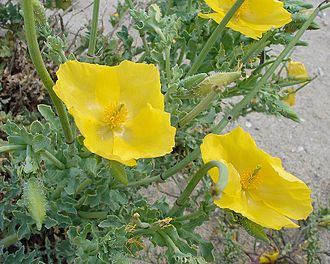 Sea poppy -- Courtesy of Wikipedia |
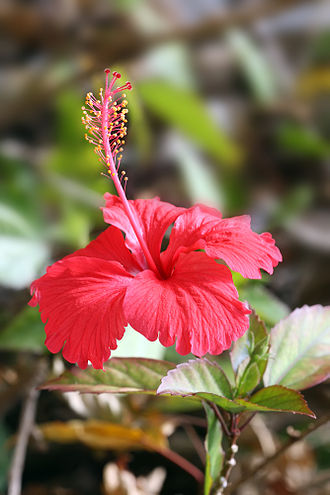 Hibisicus -- courtesy of Wikipedia |
the "sea-gardens":
Fields (and Jewett?) apparently hoped to visit the vicinity of
Athol Island, which now is part the National Marine Park, west
of Nassau. See Stark's
History
and
Guide to the Bahama Islands (1891), pp.
229-32. See also The
Book
about the Sea Gardens of Nassau, Bahamas (1917) by
Stephen Haweis. The illustration below shows the necessity
of entering a smaller boat in order to use the viewers that
allow one to see under the water.
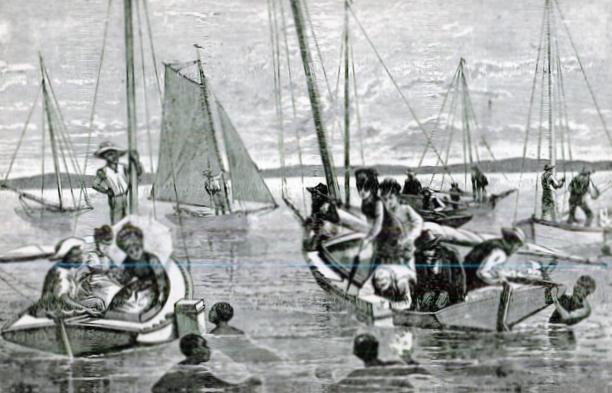
Image of tourists viewing the sea gardens near Athol Island
from Stark's History, p. 231.
to do such work as we can
find to do with all our might: See Ecclesiastes
9:10: "Whatsoever thy hand findeth to do, do it with thy
might; for there is no work, nor device, nor knowledge, nor
wisdom, in the grave, whither thou goest." Also
Colossians 3:22: "And whatsoever ye do, do it heartily, as to
the Lord, and not unto men." Perhaps also relevant is
Luke 10:27, in which Jesus says: "Thou shalt love the Lord thy
God with all thy heart, and with all thy soul, and with all
thy strength, and with all thy mind; and thy neighbour as
thyself."
Edited by Terry Heller, Coe College.
The original of this diary is in the collection of the Massachusetts Historical Society. My copy is from a microfilm, available courtesy of the University of Kansas Libraries, Lawrence Kansas: Annie Adams Fields Papers 1852-1912. Folio PS 1669.F5 Z462 1986, Reel 2.
| Works of Annie Fields |
